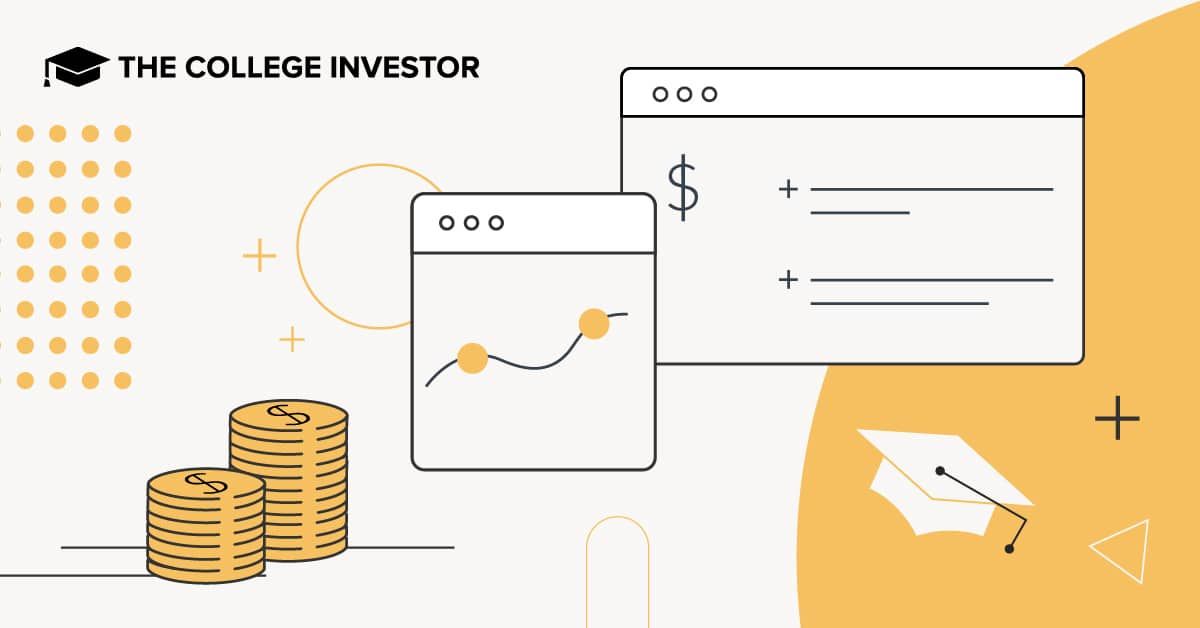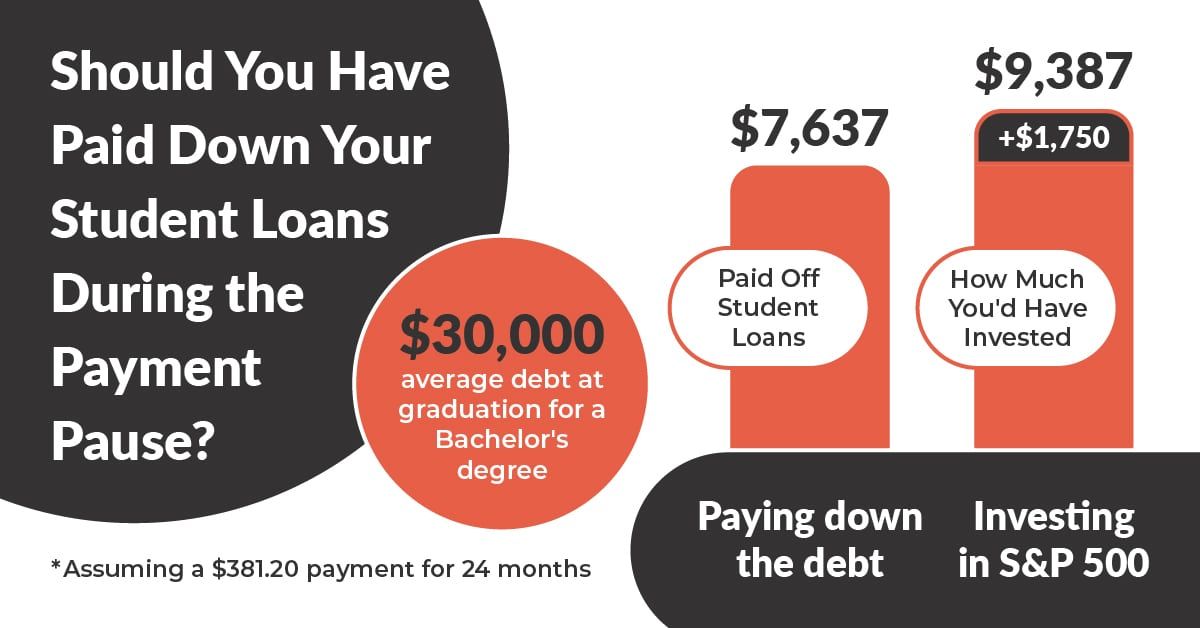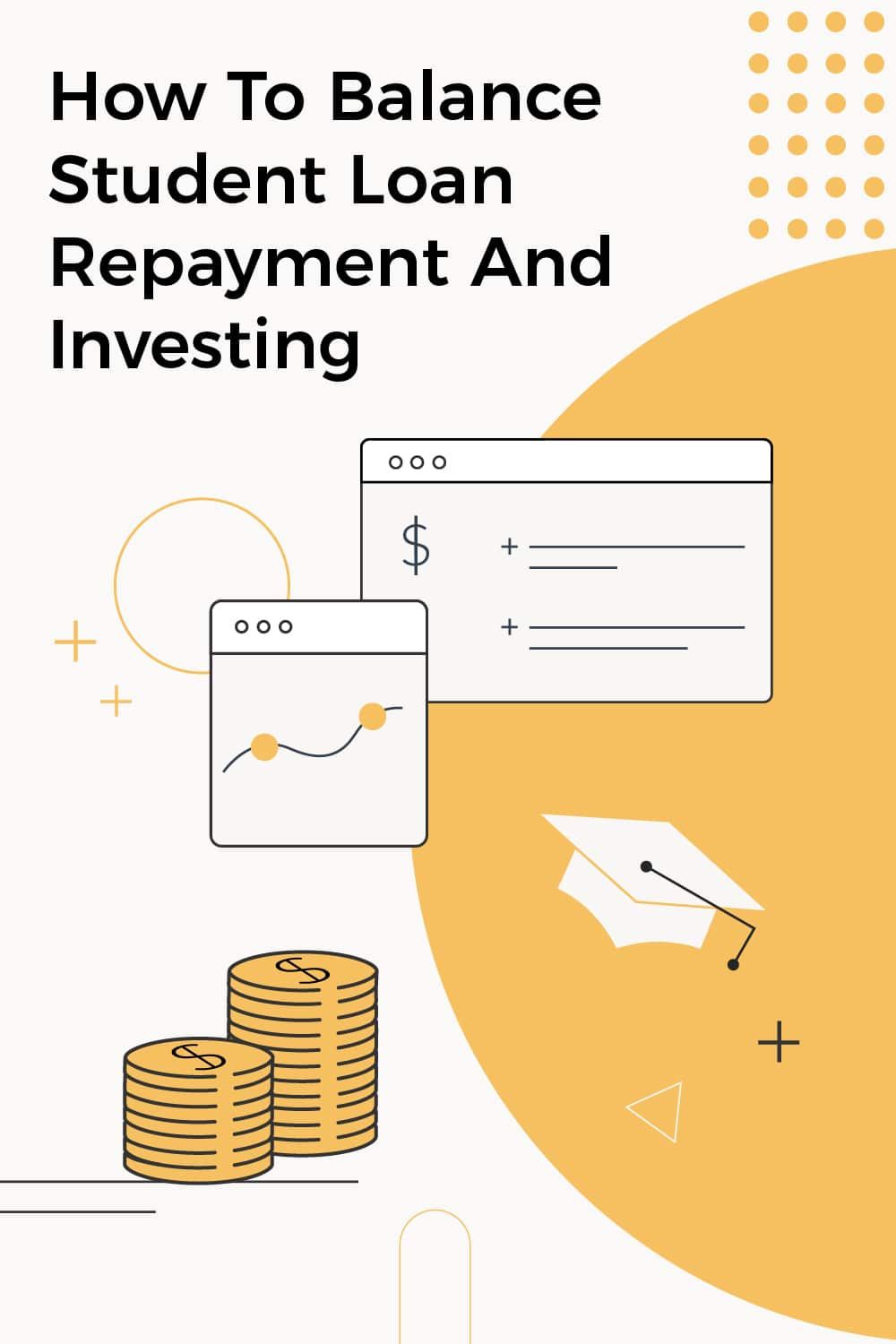
Should you pay off student loans or invest your money? With student loan repayment resuming for Americans, this is the question many are asking - especially if they saved up their paused payments.
But even for those just starting to repay student loans - should you pay more than the minimum payment, or should you invest any extra money you have?
If you have student loans but are also looking to start investing in the stock market, real estate or other types of investments, you might be wondering how to balance student loan repayment and investing. There are a number of different factors to consider, and the best answer won't be the same for everyone.
Let's look at a couple of situations when you might consider completely paying off your student loans as well as scenarios where you might be better off investing your extra money - and probably the best for everyone, taking a balanced approach.
By understanding all the implications, you'll be able to make an informed decision for your specified situation.
The Many Places To Invest Your Money
If you're in a financial situation where you've managed to set up a budget and have extra money each month, you might be trying to consider how you should best invest that money. Here are a few recommendations:
- First, you'll want to make sure that you have an emergency fund of at least $1,000. That way you can handle small to medium unexpected expenses without blowing up your budget.
- Next, start to eliminate higher-interest credit card and other consumer debt.
- After that, the decisions start to get harder. Expanding your emergency fund, saving for retirement, investing, paying down student loans or your mortgage and a kids' college fund are all reasonable places to put your money.
For the purposes of this article, we are just going to focus on the balance between student loan repayment and investing, primarily in the stock market.
Should You Pay Off Your Student Loans First?
Here are a few situations when it might make sense to completely pay off your student loans.
- High Interest Rates: If you have private student loans with a high interest rate (above 8-10%), it may make more sense to completely pay off your student loans.
- Struggling With Your Credit: If you are looking to buy a house and/or struggling to improve your overall credit profile, you might want to pay off your student loans. Removing your monthly student loan payment will lower your debt-to-income ratio and improve your credit score.
- Low Balance: If you never had a very high student loan balance or if you have already paid most of your balance off, you can consider just finishing them off and being done with them.
- Going Debt-Free: For many people, being completely debt-free is a personal goal. If eliminating your student loans would give you a great amount of personal satisfaction, then go for it!
You can use our loan payoff calculator to explore scenarios about how long it will take you to pay off your loans under your current payment schedule or if you make additional payments. That can help you decide what might make the most sense for your specific financial situation.
Should You Invest Instead?
The main reason to keep making your regular monthly payments on your student loans and invest instead has to do with rates of return. If you're paying 3% interest on your student loans and can earn 8% investing in index funds in the stock market, overall you will be financially better off taking your extra money and investing it rather than using it to pay down your low-interest student loan debt.
Here are a couple of scenarios where you should invest instead of paying off your student loans:
- Income-Driven Repayment Plans Like SAVE: If you're on an income-driven repayment plan like SAVE, and your monthly payment is very low, you should NOT be paying extra towards you loans. Rather, you should take the extra money and invest. Given that SAVE waives the "extra" interest each month and have loan forgiveness built-in, if you're not fully paying back the loan with SAVE, then don't throw good money on top of it. Invest that money instead!
- Low Student Loan Interest Rates: Investing rather than paying off your student loans only makes sense if you can get a higher return in the market. And this requires that your student loans be at relatively low (less than 5-7%) interest rates. However, most Federal student loans taken out over the last 10 years probably meet this criteria.
- Solid Financial Situation: You'll want to make sure you have a good handle on investing and an overall healthy financial situation. Investing in the stock market can be volatile in the short-term, so make sure that you're in a position where that will not affect you.
- You Qualify For Student Loan Forgiveness: If you're already in a student loan forgiveness plan or think that your student loan balance will be eventually canceled, then it makes sense to make the minimum payments and invest your money in other areas. You don't want to pay extra on student loans that will eventually be forgiven. That's a waste of money that could be invested.
Please, please, please - never pay extra on your student loans if you're going for PSLF!
Things To Consider
As you look at how to balance student loan repayment and investing, it's not always a straightforward answer that will be the same for all people. Instead, here are a few questions to ask yourself:
- Can you refinance your student loans to get a lower interest rate?
- Do you have an emergency fund that can handle unexpected expenses that crop up?
- Are you organized and savvy enough with investing to get a higher rate of return?
- How much will removing the burden of student loan payments benefit you emotionally?
- How will either decision affect your tax liabilities?
The answers will be different for everyone, but honestly reflecting on these questions can help you decide what makes the most sense for you.
Finding A Balance Will Be The Best Approach For Most
Some financial gurus like Dave Ramsey will argue that you need to completely pay off your student loans (and other debts) before you start investing. However, that's probably not the best approach for most people.
The simple truth is that investing requires both money AND time. The sooner you start investing, the more time you give your money to grow.
For example, if you want to have $1,000,000 at 62, here's how much money you'd need to invest PER YEAR by the age you start:
- If you start investing at 25, you need to invest $4,600 per year to reach $1 million (that's $383 per month)
- If you start investing at 30, you now need to invest $6,900 per year to reach $1 million
- If you start investing at 35, that number grows to $10,700 per year to reach $1 million
As you can see, the longer you wait to start investing, the more money you need to come up with to reach the same goal.
But how can you start earlier if you're burdened with student loan debt? Free Money.
What do I mean by free money? Most working adults have access to free money to invest if they look for it. For example:
- 401k/403b Matching Contribution: The average 401k match is 3% of your salary. Considering the average annual salary in the United States is $51,168, that means the free money you can get from your employer is $1,535 on average. Considering you have to contribute that amount to get the match, that means you're saving $3,070 per year!
- HSA Matching Contribution: More and more employers are offering HSA matches - and these typically don't require contributions, but rather health practices like getting an annual physical. The average employer HSA contribution is $1,000 per year. The great thing about the HSA is it's a secret IRA for investing!
Side Note: There may be other free money opportunities from your employer - including tuition reimbursement, student loan repayment assistance, dependent care assistance, transportation reimbursement, and more. While you can't directly invest these funds, they can definitely help you offset other items in your budget so you can free up money to invest.
Now, if you look at your "free money" opportunities, the average employee in the United States should be saving $4,070 per year, with just a small 401k contribution coming out of pocket. That puts you very close to the amount you need to save to hit your goals in your 20s and 30s.
Real Math: Investing vs. Paying Off Student Loans
Let's look at some real math that would have happened during the last few years. We're putting the dates so you can check our work!
Although the S&P 500 increased by about 75% from March 2020 to February 2022, the actual return on investment is slightly lower because the paused student loan payments would have been invested monthly instead of in a lump sum.
Assuming equal amounts were invested on the first trading day of the month from April 2020 to January 2022, the total return on investment would have been about 23%. That’s a better return on investment than paying down student loan debt.
Using the above example, if you have $30,000 (average debt at graduation for a Bachelor's degree) at 5% interest, your monthly payment would be roughly $318.20 per month. Paying down the debt for 24 months would reduce it by $7,636.80.
However, if you invested that $318.20 per month in the S&P 500, you would have seen it grow to $9,387. That's about a $1,750 difference. You could then take that same $9,387 and pay down your debt, or continue to let it grow into the future.

While this is an extreme example from the payment pause, the math still holds over most 10-year periods of time, even if you're only taking a little extra and investing.
Final Thoughts
There are many valid paths to a solid and stable financial future, and which path is right for you will depend on a variety of factors. While it can make sense to eschew completely paying off your student loans and investing your money to get a higher rate of return, it's not for everybody.
Take a look at the factors we've discussed and spend some time reflecting on the questions listed above. That will help you make the right path for your unique financial and life situation. And realize, it doesn't have to be an either/or decision - you can probably find a healthy balance of saving and investing vs. paying down your student loans.

Robert Farrington is America’s Millennial Money Expert® and America’s Student Loan Debt Expert™, and the founder of The College Investor, a personal finance site dedicated to helping millennials escape student loan debt to start investing and building wealth for the future. You can learn more about him on the About Page or on his personal site RobertFarrington.com.
He regularly writes about investing, student loan debt, and general personal finance topics geared toward anyone wanting to earn more, get out of debt, and start building wealth for the future.
He has been quoted in major publications, including the New York Times, Wall Street Journal, Washington Post, ABC, NBC, Today, and more. He is also a regular contributor to Forbes.
Editor: Clint Proctor Reviewed by: Mark Kantrowitz
